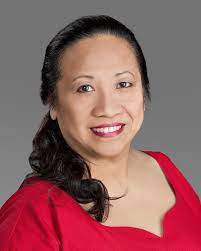
Carolyn Fe
Carolyn Fe was quite a dynamic and vibrant personality during our Zoom call today. At one point during our conversation, she used the Quebec French term ‘On clique ici’ meaning we’re clicking together, we’re making connections with each other.
Listening not only to Carolyn’s voice but to the 150 plus voices I’ve compiled over this last year, I like to think that I’ve also clicked not only with Carolyn but with these other performers who continue to add their voices to the discussion of the live theatre industry in a post Covid world.
Born in the Philippines, her family moved to Montreal in the early 1970s. Fluently trilingual in English, French and Tagalog, she started her performing career as a classically trained dancer, quickly moving to contemporary styles. Carolyn Fe eventually became a commissioned choreographer for local & international dance companies, TV and music video productions with her dance company, Phi-X 174 Inc.
An entrepreneur at heart, she left the stage to take a 25-year hiatus from performing to join the corporate ranks as an owner/operator of a human resources firm. This was a good decision as the years in corporate life gave her business skills that she utilises in her artistic life.
Carolyn came back to the stage in full force in 2005 at Montreal’s Teesri Duniya Theatre’s ensemble production of Miss Orient(ed) by Nina Aquino and Nadine Villasin-Feldman, where she jumped into three very different characters as mother to three different stage-daughters.
2014 brought her to Toronto’s stage as an invited guest singer in Raoul Bhanja’s “Life, Death and The Blues” (Theatre Passe Muraille) but it was in 2018 that confirmed her love of Toronto; when she appeared in Dora Award Winner Audrey Dwyer’s play called “Calpurnia” to sold out shows and thrilling reviews on Carolyn Fe’s performance. She won the 2018 Toronto Theatre Critics’ Award for Best Supporting Actress Award her role as Precy, in ‘Calpurnia’. Other awards and accolades include 2017 Balangay Award Nomination for Best Filipino-Canadian Entertainer and 2015 Filipino-Canadian Artist Award recipient for the North American Filipino Star Newspaper.
Carolyn is also an award winning and Juno long-listed nominee as a Blues singer/songwriter with four albums under her belt with many more in the works: collaborating with musicians from around the world with her songs charting top 10 if not, #1 on Blues charts. Her band, Carolyn Fe Blues Collective, had a long-standing 8-year residency at Montreal’s iconic House of Jazz. Sadly it ended when Covid-19 took place. Her self-produced music video, Jerusalem’s Thorns: a song from her 4th album, where she appears as the matriarch won the 2019 Fete du Clip Montreal Award for Best Video and was screened in the Luxembourg edition to compete with other videos from all over the world, while still running the festival circuit and gaining recognition.
Thank you for participating in the discussion, Carolyn:
It’s a harsh reality that the worldwide pandemic of Covid 19 has changed all of us. Describe how your understanding of the world you know and how your perception and experience have changed on a personal level.
Okay, now that I can see you at least on screen, Joe, I can comfortably say that I am of another generation and also of another generational mindset.
This pandemic has brought me back to my younger years when I was back in the Philippines. I was born there and I, lack of a better word, ‘woke up’, I became aware when, towards the end of the Vietnam War I was still in primary school. I was going to school with the children of the American GIs who were based in the Philippines and then deployed to wherever.
The pandemic brought me back to that timeframe and mind frame where there is a new normal that we have to adapt to. That people, places and things are temporary. It’s always evolving. With the pandemic, I was in Tarragon Theatre’s tech week when they announced the lock down. I was still living in Montreal. I was renting an apartment.
During tech week, the nerves were bubbling, we’re going on next week, and then the shut down. One by one, theatres started announcing they were postponing their production to three months ahead until finally we went into the theatre and Tarragon management announced they too were postponing.
I come home, my husband says don’t take the VIA train or the plane back. This is bad stuff. He drove from Montreal to pick me up, and the next day we went back home to Montreal and that was it. It’s weird that theatres are shut down, but film sets and tv studios are still working (with strict Covid protocols in place). During the year, I did return to Toronto by train. I was masked, put on gloves and wore a shield for the five-hour ride. I still wasn’t feeling comfortable with all that.
Will we ever feel comfortable again? Even when all of this is under control, but that’s a later question to answer.
Today, with this first question, it brings me back to the major shifts that I lived back in the Philippines at the tail end of the Vietnam War where things were going to be different from then on and will continue to be different. So, from a very young age, I got used to a bunch of new normals happening again and again and again.
Another image that flashed, my brother and I stuck among the American children since we were allowed and privileged to attend the American school, but what I do remember my friends crying. The soldiers would get weekend leaves. But when the parents would leave after, the heartbreak and crying my friends would have that was powerful.
With live indoor theatre shut for one year plus, with it appearing it may not re-open any time soon, how has your understanding and perception as a professional artist of the live theatre industry been altered and changed?
You know that saying ‘Necessity is the mother of invention’? This is where theatre artists and theatre creatives thrive.
I believe, in my humble opinion, all of a sudden, a big chunk of what we are used to seeing and having in the theatre world is taken away. As an artist, what do we do? What are we left to do? We continue to create.
In my formative years, I was heavily, heavily influenced by the surrealist movement. It was born around World War 1 and continued on. During these wars, what did they have? Nothing!! And from nothing everything came out.
I think someone in the Toronto theatre world coined this phrase ‘This Grand Intermission’ we’re living through. It’s a beautiful time for creatives to flourish. It’s a perfect time to sit back, and it’s okay if you don’t want to do anything. Everyone digests this new reality in their own way. But if the urge is there to create, it’s a perfect time.
That big chunk of ‘We have to produce’ is taken off our shoulders, that stress, and we can just sit back and let it flow. This is how I see this moment. There are good, bad and okay moments, yes, but these moments are full of creative opportunities. And rightfully so.
Look how Tarragon switched from live to the old-style radio plays. Factory Theatre did this thing with video. It was like television in the 50s, or even earlier as it had a ‘theatre feel’. I enjoyed that.
I agree with Kelli Fox’s statement that digital theatre is now a part of the industry along with the live element. Also, the day we can get back into the theatre and see the mish mash of technology and live at the same time, it’s exciting. Yes, it might appear frightening and unnerving, but I like being frightened, I like being unnerved. That means something will come out, so in the moment I get scared or worried, the ‘what ifs’, and then all of sudden we take that step forward, and the ‘what ifs’ dissipate.
As a professional artist, what are you missing the most about the live theatre industry?
The most…. it’s the ‘communion’ of people. Not the gathering, the immediate reaction of the audience while the artist on stage is performing. The communion between the two.
The audience witnessing what is unfolding on stage and me, as an artist and still in character but the depths within Carolyn are saying, “Oh, my God, they’re reacting; that’s their reaction to this.” That’s what I miss, that communion.
And I’m going to cheat here as well, Joe, as I want to add something else. After the five minute call, there’s that last second of the five minutes where Carolyn disappears and whatever character comes on, that one second for that character is born and says that first line. I miss that.
As a professional artist, what is the one thing you will never take for granted again in the live theatre industry when you return to it?
It brings me back to my upbringing, to my life experiences of great, great, great losses and great, great, great wins to the extremes of my life.
I’ve learned never to take anything for granted.
As a professional artist, you get a gig today, and it ends. I’ve learned to live in the moment. I’ve learned that these moments are never to be taken for granted. Joe, thank goodness you sent me these questions earlier for me to think about them before our conversation today. Gosh, you’re bringing me way back.
I had a friend in the Philippines. She was Vietnamese. She was from a privileged family. I don’t know how she was able to attend the American school I was in. I remember the day when her family had to take her out of school. We all know now why.
I remember the morning. We were bunk mates. She said, “I’m going now. Never forget this moment, okay.” And we were kids, 7 maybe 8 years of age. She held my hand, and put her nose to my nose and said, “Never forget this moment. We will be friends forever even if we never see each other again.” I never saw her again. It never occurred to me what she was talking about.
Moments like that as I grew up when I would have great losses – friends, family, things, finances, ups and downs – I would always remember her saying ‘Never forget this.” This pain strengthens.
That moment taught me never to take anything for granted.
Describe one element you hope has changed concerning the live theatre industry as a result of the pandemic.
I’m gonna cheat again, Joe.
One is the pushing of limits and boundaries. The pandemic pushed theatre companies and artists already, but there’s more room to push the envelope, more room for growth.
Another thing is the normalization of the underrepresented profiles that we have out there. It’s not’s just about the BIPOC/IBPOC and Asians. It’s also about people, and stories about special abilities, about older people, ageism. We too have stories. We too have lives that I believe is interesting.
I understand that the theatre community, and a lot of its players and managers and producers are of the younger generation; therefore, a lot of the stories are written by the younger generation.
I would love to see the young look at the old. I would love to see the perception of the elders. I think it’s too easy to write about ‘me’, the young ‘me’. I’d be curious to see who they would write about ‘us’.
Explain what specifically you believe you must still accomplish within the industry.
I’m writing for the first time in my life as I approach my sixties. I’ve learned so much already about it, about the technical stuff, but I’m told also to write from my experience, my selfish point of view. I’m thinking, “What about me? My elders have stories that need to be told.” So, I’m pushing it that way.
I would like to do, to be involved, to be part of the normalization of the ‘marginalized’ in all senses of the word, whether it be as an actor taking on the roles of a marginalized character, whether it be writing stories thereof; whether it be joining committees in Equity.
There’s a lot of normalization to be done within our industry.
Some artists are saying that audiences must be prepared for a tsunami of Covid themed stories in the return to live theatre. Would you elaborate on this statement both as an artist in the theatre, and as an audience member observing the theatre.
As an artist and audience observer, I say to both, “Why not have a tsunami of Covid themed plays?”
As an artist because it was during Covid times that a lot of people who are not used to radical changes or not used to new normals, they came out. Their social media feeds were full of how painful and how lonely Covid was to them. The human stories of Covid came out even more intense. So, why not write about it and have that ‘communion’ on stage when we will be allowed back or allowed ‘on screen’. That communion and connection are so important.
One story of being lonely might ease an audience member’s story because they might be able to connect.
As an audience member, I look forward to seeing Covid themed plays. I’m looking forward to this tsunami of Covid themed plays because everyone’s experience is a variation on the theme. We come to a certain point in life, and we look at the ‘young ins’ and say, “I remember when…” But for the young people, they may say it’s the end of the world for them on account of Covid, but for us older folks, we can say, “It’ll be okay.”
As an audience member to see all of this unfurl on stage and to see the chaos that is going to be written, and then us sitting there saying, “We’ll be fine. We’ll be okay.”
What better way to put communion into action then to participate in, to see and to listen to Covid themed plays and stories.
As a professional artist, what specifically is it about your work that you want future audiences to remember about you?
That I ‘communed’ with them, and that they ‘communed’ with me.
One day when we will meet in person and, hopefully, in the theatre environment, I’m very introverted and shy person before and after the show. I will say hi. I’m open with you right now, Joe, because I’m protected by the fourth wall of the screen. But I’m not performing, I want to clarify that point.
I want audiences to remember that I ‘communed’ with them while I was on stage telling whatever story I was offered whether it’s my story I wrote or another one.
To learn more about Carolyn Fe, visit the following social media links:
Youtube channel: www.youtube.com/carolynfe
Albums: https://carolynfe.bandcamp.com/
Facebook, Twitter and Instagram: @TheCarolynFe
Website: http://www.carolyn-fe.com/




